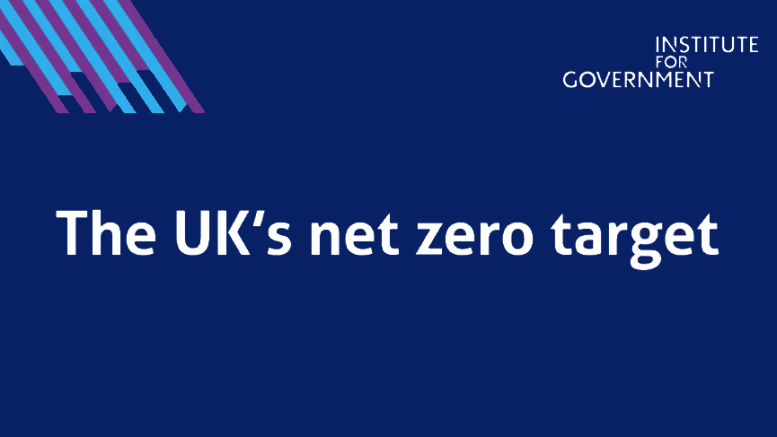
Independent ‘think tank’ the Institute for Government has published a report which concludes that stronger leadership and co-ordination from the prime minister is needed if the UK’s commitment to reach net zero by 2050 is to be credible.
‘Net Zero: How government can meet its climate change target’ warns that, over a year on from adopting the target, the UK has not yet confronted the scale of the task.
The report claims that meeting the commitment is a more difficult challenge than responding to the Covid-19 crisis or finalising Brexit, and will require transformations in every sector of the UK economy, sustained investment over three decades and substantial changes to everyone’s lives.
The report says a lack of co-ordinated policies, constant changes of direction, a failure to gain public consent for measures and too little engineering expertise and delivery capability has left the UK well off track to meet its target. The absence of a comprehensive plan for achieving net zero has deterred private sector investment and left people unsure of how to act.

The authors of the report call on government to publish a clear plan setting out, sector by sector, how emissions reductions will be achieved and when decisions will be made where technology is uncertain. The Cabinet Office should be made responsible for co-ordinating the plan and holding departments to account for delivery.
Polling suggests two-thirds of people have not heard of net zero, despite the fact that it will mean changing the way they heat their homes, the cars they drive and what they eat. The government should build on parliament’s climate assembly initiative and level with the public on the changes net zero will require.

The government needs to work out how to pay for the shift to a carbon neutral economy – estimated at 1-2% of GDP per year – and how to ensure costs are distributed fairly. It should also renew its focus on preparing for the impacts of a changing climate, such as increased flooding and heatwaves.
If the UK fails to show that it is serious about its climate change targets, it risks wasting a golden opportunity to demonstrate leadership in the fight against climate change when it hosts next year’s rescheduled COP26 summit.
The report recommends that the government should:
- Take responsibility for net zero out of BEIS, which lacks the clout to develop and implement the necessary plan, and create a new net zero unit in the Cabinet Office with a senior Cabinet Office minister given responsibility for net zero;
- Ensure that the Treasury makes net zero a big theme of the spending review and produces a tax strategy to support net zero;
- Build on parliament’s climate assembly initiative to maintain public support for action;
- Create a climate change cadre, with science and engineering expertise at its core, within the civil service;
- Build on the successful model of the Olympic Delivery Authority to ensure big changes like housing retrofit and the switch to electric vehicles happen smoothly;
- Support the creation of a dedicated parliamentary net zero committee to hold the government to account on progress in reducing emissions.

Senior fellow Jill Rutter, who is an experienced former senior civil servant, having worked in HM Treasury and No 10, said: “Net zero is the biggest challenge facing government.
“It needs a government that can think long-term, work with business, take the public with it and is able to use the best science and technical expertise to ensure the UK reaches net zero at least cost to the economy.
“The Prime Minister has said he is committed to the goal – he needs to show that the UK has a plan to get there.”

Institute for Government.
Director of research Emma Norris, one of the four authors of the report, which is available on the Institute for Government website, added: “Government has talked big on climate change but then baulked at measures that risk public opposition.
“Parliament’s climate assembly has shown the potential for involving the public in the big choices facing the country – the government now needs to make that business as usual.”

Tom Sasse, the senior researcher whose previous work includes a series of reports on government outsourcing and the legacy of the collapse of Carillion, said: “The government has a golden opportunity as host of COP26 to help the world to avoid the worst impacts of global warming.
“But it risks a COP flop if it fails to get its own house in order and show its targets are credible.”




Be the first to comment